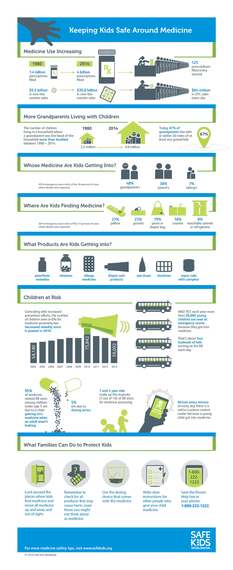
Every nine minutes a child is seen in an emergency room for medicine poisoning. And in almost half of those visits (48 percent), a child got into a grandparent's medicine. Not that parents are off the hook -- 38 percent of the visits were due to a child getting into a parent's medicine. But let's look at why this message is important for grandparents.
The population in the United States is generally aging and living longer. The number of adults ages 65 and older grew from 34.2 million in 2003 to 46.2 million in 2014 and it is estimated to almost double again by 2050. This trend is impacting household composition and grandparent involvement in their grandchildren's lives. Today more than seven million grandparents live with their grandchildren ages 18 and under.
Now, living longer and living with, or close to, a grandchild is a blessing. My great-grandmother lived with my family and my grandmother lived across the street. I treasure what that meant to me. And when I became a mother, both my grandmother and mother helped with the care of my young children. Their loving support forged deep and lasting bonds and provided life-long lessons for my children and me.
But with this trend for longer life and greater engagement with grandparents comes a bigger risk for children. Increasing age is often coupled with increasing health care needs that frequently require treatment in the form of medicine. Almost 40 percent of adults ages 65 and older take five or more prescription medications.
It's not just the number of medicines older adults take, but also how they store them. Older adults often use daily pill organizers or easy-to-open caps instead of child-resistant bottles. This presents a potential danger when medicine is left in places that can be seen or easily reached by a child, particularly curious 1- and 2-year old kids, who make up seven out of ten emergency room visits for medicine poisoning.
Our message is a simple reminder to all who care for children:
•Check all the places where kids could find medicine and move all medicine up and away and out of sight.•Remember to safely store all potentially harmful health products.•Only use the dosing device that comes with the medicine.•Write clear instructions for caregivers about your child's medicine.•Save the Poison Help Number in your phone: 1-800-222-1222.
And please remember that child resistant does not mean child proof. It only means the packaging is more difficult for children to open.
In the end, we want grandparents, parents and all caregivers to remember that the first line of defense in preventing medicine poisoning is family and with a few simple precautions we can help keep our kids active, healthy and safe.
For more information, visit safekids.org and here's an infographic to share with your friends and family.
